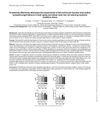September 2024 in “Chemico-Biological Interactions” Finasteride improves heart function in obese and aging male rats by reducing oxidative stress and p53 protein levels.
July 2024 in “Behavioural Brain Research” Long-term finasteride treatment reduces depression and brain issues in obese male rats.
 March 2024 in “The journal of sexual medicine”
March 2024 in “The journal of sexual medicine” Finasteride's negative effects on brain tissue in male rats may be reversible after stopping the drug.
[object Object]  February 2024 in “Brain research bulletin”
February 2024 in “Brain research bulletin” Blocking androgen activity in newborn rats affects body weight and appetite-related hormones differently in males and females.
 December 2023 in “Alzheimer's & Dementia”
December 2023 in “Alzheimer's & Dementia” Long-term use of a drug for hair loss and prostate issues can cause metabolic problems and depression-like behavior in young male rats.
 November 2023 in “European heart journal”
November 2023 in “European heart journal” Finasteride improves heart function and balance in aging and obese male rats by reducing oxidative stress.
 May 2023 in “Al-Mağallaẗ al-ʻirāqiyyaẗ li-l-ṣaydalaẗ”
May 2023 in “Al-Mağallaẗ al-ʻirāqiyyaẗ li-l-ṣaydalaẗ” High doses of rosemary extract can harm the liver, kidneys, and reproductive organs in young rats.
 September 2012 in “The Egyptian Journal of Histology”
September 2012 in “The Egyptian Journal of Histology” Flutamide caused damage to male rat reproductive organs and may affect fertility.
October 2022 in “Biomolecules” Allopregnanolone can reduce gut inflammation and normalize neurotransmitter levels after finasteride withdrawal.
 6 citations,
May 2022 in “Research and reports in urology”
6 citations,
May 2022 in “Research and reports in urology” Caesalpinia bonduc seed extracts may help treat enlarged prostate in rats.
 5 citations,
January 2016 in “Asian pacific Journal of Tropical Biomedicine”
5 citations,
January 2016 in “Asian pacific Journal of Tropical Biomedicine” Phthirusa pyrifolia extract may lower testosterone and harm male rat reproduction without damaging the liver or kidneys.
6 citations,
July 2018 in “Steroids” Testosterone changes how certain channels work in male rat reproductive tracts, affecting fertility-related fluid balance.
 October 2024 in “Journal of Neuroscience Research”
October 2024 in “Journal of Neuroscience Research” Long-term Finasteride treatment reduces depression better than short-term treatment in rats.
 1 citations,
April 2021 in “Journal of Cardiovascular Pharmacology”
1 citations,
April 2021 in “Journal of Cardiovascular Pharmacology” Testosterone plays a big role in heart and nervous system damage caused by inflammation in male rats, suggesting that blocking testosterone production could help manage this condition.
 6 citations,
May 2020 in “Pharmacology Research & Perspectives”
6 citations,
May 2020 in “Pharmacology Research & Perspectives” A new gel form of minoxidil is equally effective for hair growth and safer for the heart and other organs than the traditional solution.
 4 citations,
January 2013 in “PubMed”
4 citations,
January 2013 in “PubMed” Testosterone and finasteride raise insulin and zinc, lower chromium in male rats.
1 citations,
June 2022 in “Frontiers in Neuroanatomy” Early hormones shape sex-specific differences in rat glands.
1 citations,
April 2020 in “Medico-Legal Update” The flower extract lowered testosterone, progesterone, and related gene expression in male rats.
[object Object]  June 2024 in “Pharmacon Jurnal Farmasi Indonesia”
June 2024 in “Pharmacon Jurnal Farmasi Indonesia” A 1:3 ratio of virgin coconut oil to candlenut oil is best for promoting hair growth.
 December 2023 in “International journal of multidisciplinary research and analysis”
December 2023 in “International journal of multidisciplinary research and analysis” SH-MSCs gel can effectively treat alopecia by increasing IL-10 and decreasing TNF-α gene expression.
 December 2023 in “Alzheimer's & dementia”
December 2023 in “Alzheimer's & dementia” Finasteride may help reduce anxiety and depression in elderly but might cause depression in young men.
9 citations,
January 2017 in “Archives of biochemistry and biophysics” Testosterone raises blood pressure and changes kidney protein levels.
 49 citations,
March 2018 in “Toxicological sciences”
49 citations,
March 2018 in “Toxicological sciences” Low doses of mixed chemicals cause permanent reproductive malformations in male rats.
 24 citations,
January 1989 in “Archives of biochemistry and biophysics”
24 citations,
January 1989 in “Archives of biochemistry and biophysics” Male rats have androgen receptors in their liver, which are different from proteins that bind estrogen.
10 citations,
September 2015 in “Folia Histochemica Et Cytobiologica” Finasteride treatment in male rats can reduce fertility and affect sperm development in their offspring.
















